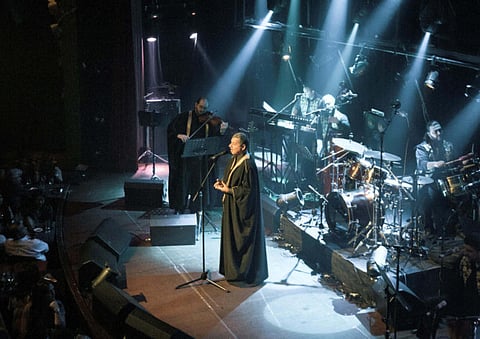Soundbites: The strains of Ramadan at MusicHall
Traditional Arabic music will be the highlight of music destination during the month

With Ramadan comes a quieter Dubai. Car stereos are turned down, night club turntables are put in storage and the guitar amps of Bur Dubai’s bars take a summer holiday. Instead, it’s the faint twang of the oud and other regional strings that provide the soundtrack to a calmer month. Over at MusicHall, the normally boisterous Beiruti weekends will give way to Masrah Ramadan, a souhour with live performances by artists from around the Arab world. “It is an experience taking the audience back to Ramadan roots and celebrations in a spirit of joy, sharing a good meal in a friendly atmosphere, MusicHall’s founder, Michel Elefteriades, says. “Masrah Ramadan is a nostalgic tribute to the Golden Age of the Arab world through the music and culture of this epoch.” Read on for more about this unique Ramadan offering.
Q: How is it different from a normal MusicHall experience?
A: The experience is completely different: while in MusicHall people usually interact with cultures from all around the world, experimental and musical fusions, during Masrah Ramadan they will be enjoying traditional music from the Arab world. The setting will also be different; black and white footage and images will be projected all over the venue’s walls.
Q: Isn’t live music not permitted during Ramadan?
A: This is a false perception. Music has always been a part of the Arab culture. Of course, not all themes and styles are appropriate when it comes to religious celebrations and festivities, which is also the case in other religions.
Q: Tell me about the artists and music we can expect.
A: It will be the most traditional form of classical Arab instrumental orchestra, known as “takht”, accompanying singers performing different genres of traditional Arabic music. The music style will be representative of the entire Arab world: Levantine, also known as Bilad Al Sham, Gulf and Egyptian.
Q: Will there be different acts every night?
A: We will be presenting several acts per night, each having their own identity.
Q: What is the history of Masrah Ramadan, and is this something you’ve done in MusicHall in Beirut before?
A: Masrah Ramadan has existed for centuries all around the Arab World, mainly in the big capitals such as Baghdad and Cairo, not just in Lebanon. It has been known as a place of gathering where people would meet to enjoy traditional music, which they would consider as enriching to their celebrations during Ramadan. This is a premiere for MusicHall; it is the first time we are doing Masrah Ramadan.
Q: What about the food served?
A: The food will consist of traditional Arabic mezze and oriental dishes. Shishas and non-alcoholic beverages will also be served. The fare will be of a minimum of Dh115 per person (not inclusive of shisha).
Q: The press release refers to the “Golden era of the Arab world”. What is meant by this — when was it and what made it a golden age?
A: The “Golden era of the Arab World” is a cultural renaissance that began with Al Nahda, in the late 19th century and went on until the 1950s. It was an era of prosperity, tolerance, flourishing arts.
Q: MusicHall Dubai has been operating for a while now. How is the venue performing? What would you tell people who have not been there yet?
A: MusicHall Dubai is doing very well. What came as a surprise was the fact that there was no low season for us in Dubai. The venue has been working with full occupancy since the very first weekend up to today. I would tell people what any owner would say: go there!
Don’t miss it:
MusicHall is at the Jumeirah Zabeel Saray hotel on The Palm, and will be open during Ramadan from Saturday to Sunday for suhour from 9pm-2am. Call 056-2708670 or 04-4476646.



